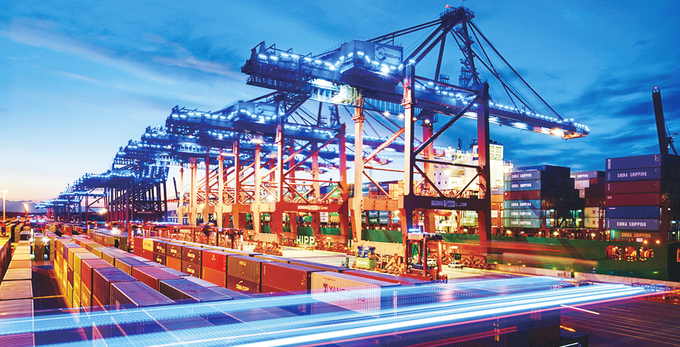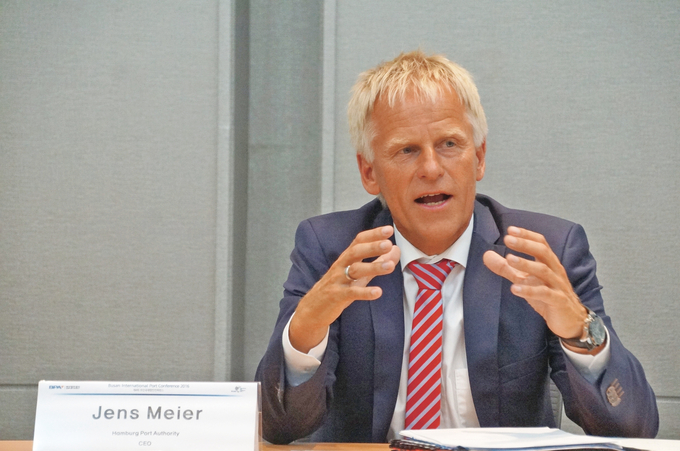The Busan Int'l Port Conference(BIPC) was held during the 3rd and 4th of Oct. 2016 under the theme of 'Cross Over the Wave of Uncertainty'. BIPC is the unique specialized port conference in Korea which was first held in 2013 in commemoration of 10th anniversary of Busan Port Authority. This time Mr. Jens Meier from Hamburg Port Authority joined the conference as a guest speaker and Media KN(BVL Korea and the publisher of Shippers' Journal) was able to have an separate interview with him.
Q. As you know, there is an ongoing world-wide recession, which probably has a significant effect on the traffic of the port of Hamburg. Have you had any fluctuation of the traffic brought on by economic downturn? If any, how are you going to cope with it?
First of all, I'd like to point out that all the ports world-wide made a big mistake by just counting container as a unit because we always have to look at the added value we bring to the goods of how much income we have on the money side, on the tax side, for the city, for the state and for the country. Many container ports are only looking at the number of the containers.
In Hamburg, I think this year we would have no decline. It will be, we will have increasing numbers when you look at the container counting. But the most important number is not the total unit. It is the number of the containers we have the hinterland connection.
Internetworking means that putting the container on the rail and bringing the containers to the other places to the Germany or in Western and Eastern Europe. The reason is, with this kind of containers, we earn much more money than with the feeder containers.
When you just put the container from one vessel to another, there is no added value, it is just movement. and this is the value price sensitive segment.

If the price is not good enough, you look this piece and for statistics, this container is always counted twice because the container comes in the port counted and then you put the container on the feeder vessel, it is the container as counted second time. In Hamburg, if we put down the container to the port, move the container to the rail, we do not count the container again.
When you look at concrete numbers, we had every year for last three or five years and all time high on the hinterland connection. That means we have more than 2.3million containers on the rail, and these containers we earn much more money.
And the second point is that Hamburg is an universal port. Universal port also moves heavy materials, grains and so on, we have increasing rates, containers in China get decreasing rates, but we have also increasing rates with container to northern America. We are not dependent on the one reach and we are dealing in Hamburg, that means the port as the whole world. And that is also important that we are not dependent on one client or one market.
Our strategy is to deal with high valued goods. You count the containers, that is a big mistake in. What we are looking on is the real value of the goods. If you have high quality things in the containers, it is good and that is our strategy how we work with the recession.
If there is the worldwide recession when we see the number of transportation going down, we try to use that time to fix some infrastructure plans and some new projects which makes us fit for the future when the numbers are growing up
And if the infrastructure is ready, then you can go little bit more aggressive to the market to try to get more volume if you want to. It is a very special Hamburg approach.

Q. Emission from the ship is getting a big issue in the shipping and port industry. The regulation is being strengthened under the IMO rule. Do you have any incentive system for environmental vessels like LNG fueled ship calling in the port of Hamburg?
Several years, we have had incentives for eco-friendly vessels or trains and so on. In our point of view, sustainable growth can only happen if you take care of the inhabitants in the environment surrounding of the port because we always try to keep the acceptance of the port by the inhabitants of the city of the Hamburg.
That was the reason why we implemented very early the environmental shipping index, that is standardized by the IAPH measurement for environment friendly vessels.
You also have to know that Hamburg always tries to be at the leading edge of this initiative by the IMO to reduce the sulphur percentage in the marine fuel. In the port of Hamburg we are already only using normal truck diesel, low-sulfured diesel trucks on the road since many years so this is nothing new for us that we are using that in the port as a mass and therefore there is no special incentive for using desulfured diesel.
For LNG, we have special incentives if you have LNG vessels, you get a special bonus, but we don't have any LNG vessels right now at the port in reality. But we also give incentives for example if you have onshore power supply system on board that you are able to receive electricity on the shore. You can turn off your machine, and using electricity on the land side. Therefore you get also an incentive reduction of public use for example.
We expect the first full LNG vessel in 2018 and then also this kind of the vessels will receive another bonus. It is already in place and every year we think about what things can be changed and what should be changed. To give you an impression for example, in Hamburg, it is also important to give incentives to the rail operators who are using noise reduced wagons. The wagons are very loud when they use that waste. We sponsor incentives rail operators using special noise reduced wagons and also a filter systems reducing particles.
We always since many years have kept an eye on the incentive system for LNG. To be honest, right now it is absolutely too early. We have it already in our system. If you come with LNG vessel, you'll get incentive. But there is none, not on board, not on the trip. The first one from UASC, is now under construction. So this will take sometime. The bunkering process is already and the vessels might come and the shipping lines are able to finance new technology that is other challenge. Hamburg is ready for them but we expect the first vessel in 2018 and these are not container vessels, these are cruise vessel because they are earning a lot of money, they are profitable. They are able to spend money to sustainable things much more than the container shipping lines.

Q. The subject of International Supply Chain Conference held in Berlin in Oct. was ‘Driving Change’, which is directly related with Digitization. The digitization in logistics is a key issue in which the whole world is interested. Could you tell me how much the digitization has been applied to the port of Hamburg so far and what benefits have you achieved by taking advantage of digitization?
For a member of starting to so called smart-port projects, intelligent ports projects in 2008, but we also were the first port in the world in 1985 who had a port community system. So first, the IT system in port is the communication platform for all the stakeholders in the port and was implemented in Hamburg in 1985. It was a long time ago.
We were one of the pioneers. And we set up we signed the confluence, Busan international port confluence yesterday the second meeting of the our so called chain port initiative that means we want to connect this intelligent smart ports with each other. We want to share data, and we have to realize that it is one of the outcome of the meeting that we, everybody is looking for standards and one of the fine worldwide standard.
But our impression and our agreement is to understand it is too speedy development in different speeds. Digitisation is much faster than international standardization process can be. So we decided to start with closest standards, we set some standards right now and start that we can be more efficient in the work together then it can be more efficient in the equipped planning, if you look at the apps world-wide how you can book hotels or flight and so on.
Shipping industry in ports are far behind that. It takes a lot of time, The ports are the interfaces in the middle of the supply chain and we decided to found the group of initiative to the chain port to figure out who has the best practices and the Hamburg has the best practices sharing some information, Busan has the best practices and we brought them together and Kieran Ring, our moderator he needed I put my solution, chain port appstore and Busan brings his solution and appstore and you can use it by network. If you want to use it you can download it.
It limits simplifying reality but it really looks like. That is the process we started in the April in 2016 in Hamburg and the second meeting was here. We wanted absolute necessity that we are working closer together in the digitisation process you call it 4.0 and we already reads the first 5 examples.
For example, in Busan we share data of liner services and also storage and port services under one web covering. When someone in Hamburg is looking for special service in Busan, you can go in to the Hamburg interface, you can ask for the services in the port of Hamburg, heavy materials for example, who can handle that, who can ship that. On the other hand, you can see who can handle that in Busan and who would be the last mile logistics company for your products in Busan and it is also the other way round.
So we not just break down concepts and visions, and for us it is always important that we send out and show some concrete and pragmatic examples that we already share.
In logistics area, sometimes we have some waits in the supply chain. The only chance to handle that is to implement very clever and intelligent thesis cross world systems and that is what we did in the past and we share our knowledge to our partners and when you do that you recognize that your partners are also clever and intelligent solutions that you have never thought about before.

















